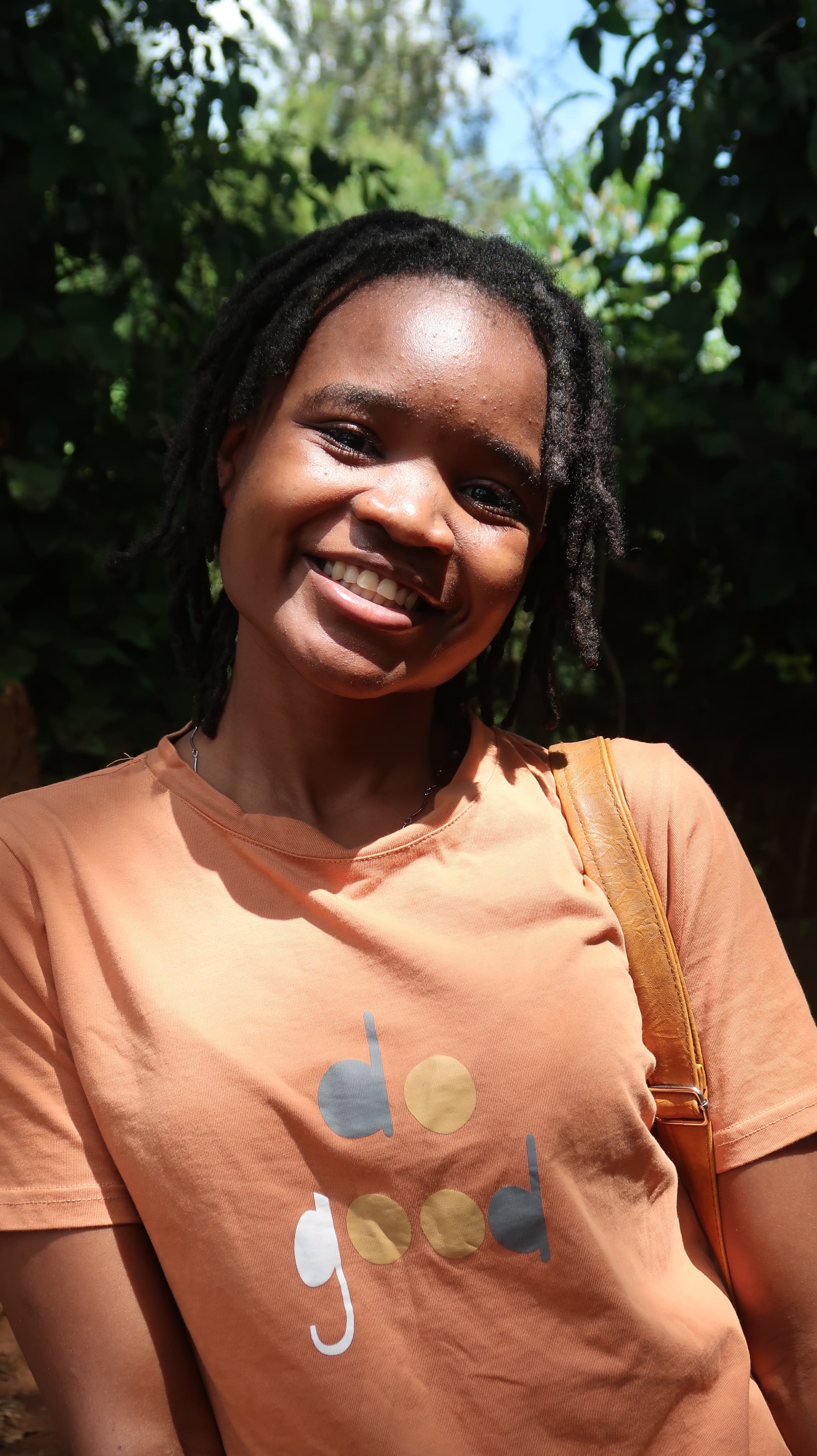I still remember the first time I saw Clare Wahome on stage. The year was 2019 and I had gone to the Kenya National Theatre to watch a play called Razor by Millaz Productions. A musical highlighting the harmful FGM practices in the Maasai community, the play was a standing-ovation experience that had the entire theatre in an uproar.

But what was even more dazzling than the play itself were the actors. Clare Wahome, who played one of the main characters – a girl from the city who had just arrived in her Maasai hometown – had us laughing, crying and empathising with her. By the time the curtains were drawn, I, and I suspect everyone else in the theatre, was intrigued. I wanted to know more about this actor who had embraced her character so well.
Fast forward to 2024 and Clare Wahome is now the CEO and Producer of Millaz Productions Kenya, a role she has taken up just as impeccably as her acting on stage. With her on the reins of Millaz Productions, the company has received a couple of nominations and awards, including five awards in The Kenya Theatre Awards 2022 where Clare also won the Best Producer of the Year.
In the Kenya Theatre Awards 2023, Millaz Productions received nine nominations and won three awards including Best Lighting, Best Musical Score and Best Sound Design. Clare received the Best Female Actress in a Leading Role for her character in The Dying Need No Shoes, a two-person play that addressed the mental health issues surrounding an abusive home.
But the successes of Millaz Productions do not just stop at the theatre. Actors, actresses and directors from the group have also grown to be recognised and accomplished figures in the Kenyan Film Industry. Ben Teke, who was Clare’s co-star in The Dying Need No Shoes, has a lead role in the Showmax series Untying Kantai and is also a major character in the popular show Njoro Wa Uba.
Brenda Gesare aka Red Brenda, who has acted in many Millaz plays including the recently shown Backstreet, has major roles in Grace Kahaki’s Showmax TV Show Single Kiasi and Rembo TV’s dramedy series Pink Ladies.
Faiz Francis Ouma, who directed Backstreet and is a major part of the Millaz team, is one of the main actors in the highly-streamed Kenyan Netflix TV series Volume and is also one of the leading actors in Untying Kantai.
It’s clear that Millaz Productions has had several good years concurrently. Everyone in the company is progressing, and it does not take a genius to figure out that it’s probably because of the great leadership exhibited by their CEO, producer and actress Clare Wahome.

How does she run a theatre company so well? This is Clare Wahome’s story.
An actor born for the stage
When I ask Clare Wahome to describe herself, she says:
“I am a twenty-six-year-old girl who is the current CEO of Millaz Productions. I am also an actor, a friend and a producer.”
An actor born for the stage, Clare started acting from a young age in primary school. However, it wasn’t until she joined high school in Riara Springs Girls and participated in several drama festivals that she saw acting in a different light. For her, it became a passion that she used to escape from the otherwise cumbersome schoolwork.
“Even before I joined high school, in primary, I used to participate a lot in drama and music festivals. I’d do plays and poems,” she says. “Of course, in primary, it was taken very lightly. It was more like if you wanted to, you could cram lines and go for the competitions. But in high school, it was taken very seriously. In fact, it was considered a whole extra-curricular activity. I think I took it quite seriously then.”
Being an excellent actor even at such a young age, Clare won the Best Actress in a drama festival and her school won the Best Play in 2012 and 2014. It was during this period that she first met Xavier Nato, the founder of Millaz Productions. Xavier loved her acting on stage and wanted her to join the company.
She later finished high school, joined JKUAT University to study Telecommunications and Information Engineering and was for a while, part of Igiza Arts Productions, a theatre company that also produces many astounding plays. In 2019, Clare formally made her debut in a Millaz Productions show, and that play was Razor.
Since then, she has acted in several plays and embodied many characters on stage. But how does acting make her feel?
“Acting makes me feel like I am not myself. I get to embody a character. I am placing myself in the shoes of this character. I am making them come alive. I am imagining someone who actually goes through these things. So I have to make it as authentic as possible.”
But embodying a written character is not as simple as it sounds. Sometimes an actor may find a character whose story is so heavy that it takes more than a few takes to capture. In Clare’s case, that character was in the play The Dying Need No Shoes.
In the play, a two-hander that featured her co-star Ben Teke, Clare had to play a teenage girl who was undergoing physical, sexual and mental abuse from her father. Embodying that character was difficult, to say the least. To fully immerse herself in the story, the director of the play showed her videos and movies of people who have gone through a similar ordeal to get her into a similar mind space.
They would also play immersion games to get them “in the zone” before any rehearsals of the play. These immersion games are what Clare, as the current producer of Millaz, also frequently employs for the plays they produce.
Producer of the Year
There comes a time in everyone’s life when they have to transition and for Clare, her transition from being an actor in Millaz to being the CEO and producer happened in 2020. At this time, she was both an actress and an active member of the company. The former Kakamega Senator Hon Cleophas Malala was the producer, having co-founded the company with Xavier Nato.
2020, however, was a game-changer. COVID-19 had just hit and the theatre scene, which majorly relies on shows, was shut down. This meant that theatre production companies like Millaz had to look for other means of survival. Xavier Nato, who was then managing the company alone, ventured into film. Balancing both film production and Millaz weighed on him.
To take some weight off, he called for an election in Millaz for a new producer and nominated Clare Wahome for the role. When the elections were conducted, Clare was voted as the new CEO and producer of Millaz. It’s been several years since then, and Clare has done a tremendous job in producing for Millaz. So, what does producing a play involve?
“The producer does a lot of planning and logistics for the play from the food, to the costumes, to how the sets will look like. I look at the pricing and the budget and everything that helps with the productions up to the posters, the marketing, contacting the media etc. I also search for partners or sponsors for the production. So yeah, basically, I act like a bridge between the company and the actors, directors and scriptwriters.”
If it sounds like a lot of work, then that’s because it can be. But Clare does it so seamlessly it’s hard to see how taxing it can be. So far, she is doing an amazing job, so much so that during the first edition of the Kenya Theatre Awards, she was nominated and won the Best Producer of the Year 2022 for the show Blackout, which she produced.

“The nomination came as a shock because I was among guys who had been doing theatre for way longer than I had, people I admired since I was young. I thought, ‘I’m still learning from these people’. Also, I was the only lady nominated, so it was super shocking but really motivating. In the same awards, Millaz also won five awards. It was a good motivation to get that recognition on the first show we had done after COVID-19.”
What has made Millaz Productions succeed however is not just the undeniable talent each member brings to the table. According to Clare, they are all friends first before anything else. Their bond allows them to help each other when stuck. If a scriptwriter has writer’s block, for example, they all come together and share ideas on how to move the story along.
“There’s a lot of work that my team does. There’s a lot of dedication and passion. I feel the team does an amazing job because, for us, we are first friends.”
This sentiment is not only shared by Clare but by everyone in the company. Faiz Francis Ouma – actor, director and a core part of Millaz – says:
“I think Millaz is a creative hub for first-time, upcoming, experimental and curious artists. It’s the only company we are allowed to experiment with. The word is just to try out what we want. So that gives us space to explore and grow and make all the mistakes before we get into the real entertainment industry because Millaz is like the first door you enter before you get into the industry. It’s like you know, one of the best theatre companies of our generation.
“As for Clare, I think she is a very focused, hardworking and visionary CEO. She has a passion for the arts and one thing about her is that she is going to show up. She might not have a way forward but she will show up for Millaz and for you. I think she is the best CEO and producer to have at the moment. She has the ability, power and knowledge to bridge the gap between artists and the business side. I can’t wait for her to realise her full potential and put all these things into perspective.”
Chindia, scriptwriter for Millaz Productions who wrote the recent play Backstreet that dealt with highlighting mental health issues, says:
“At the top of Kenya's theatre industry, Clare Wahome is the vibrant CEO of Millaz Productions, a business that is hailed as the greatest in the country. Clare is an engineer by profession, but she also possesses a wealth of leadership qualities and performance skills.
“She proves that age is no barrier to success by driving Millaz Productions to new heights with her young energy and creative vision. Clare demonstrates that there are many opportunities in the arts via her dedicated mentoring of young women. Her story is a shining example of empowerment and achievement, making her a valuable resource for the creative sector.”

As for the future, Clare Wahome thinks it’s in more growth.
“For Millaz, I would like it to grow past where it is right now. I feel so happy when I see people like Faiz on Netflix and Showmax, people like Brenda on Maisha Magic. It means we are really growing because people who see our plays recommend these actors and it becomes easier for them to get these roles. It makes me really happy to see people take their work seriously as it gives the actors a better platform. Film is paying so much better than theatre, that’s a fact. So when I see they are getting to bigger platforms, it feels like we have set the foundation because we (Millaz) are a stepping stone for your star to shine brighter out there.”





